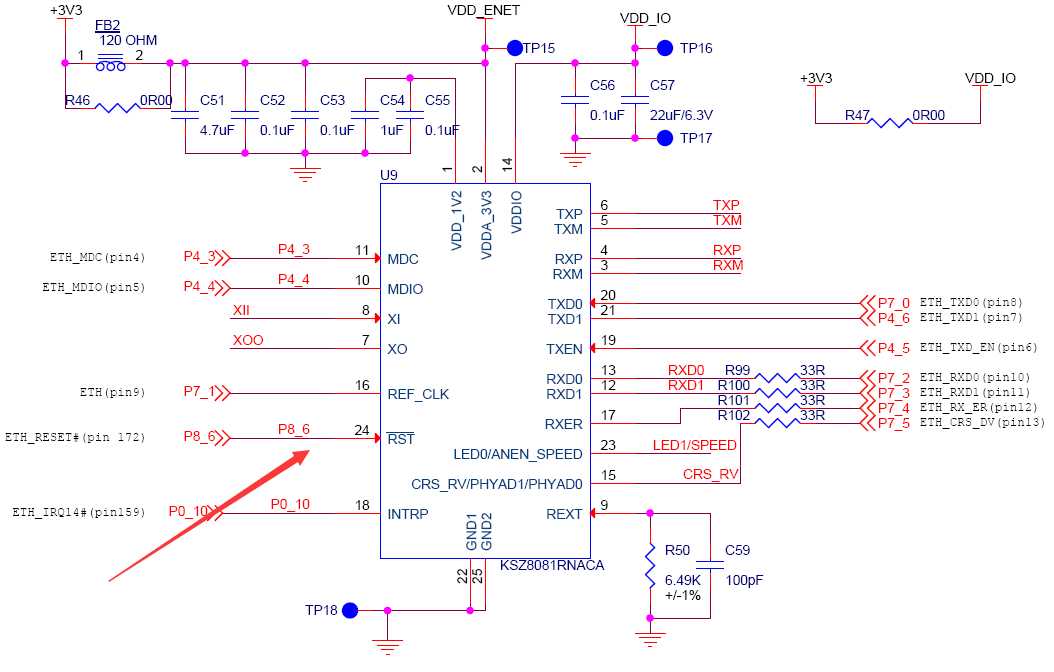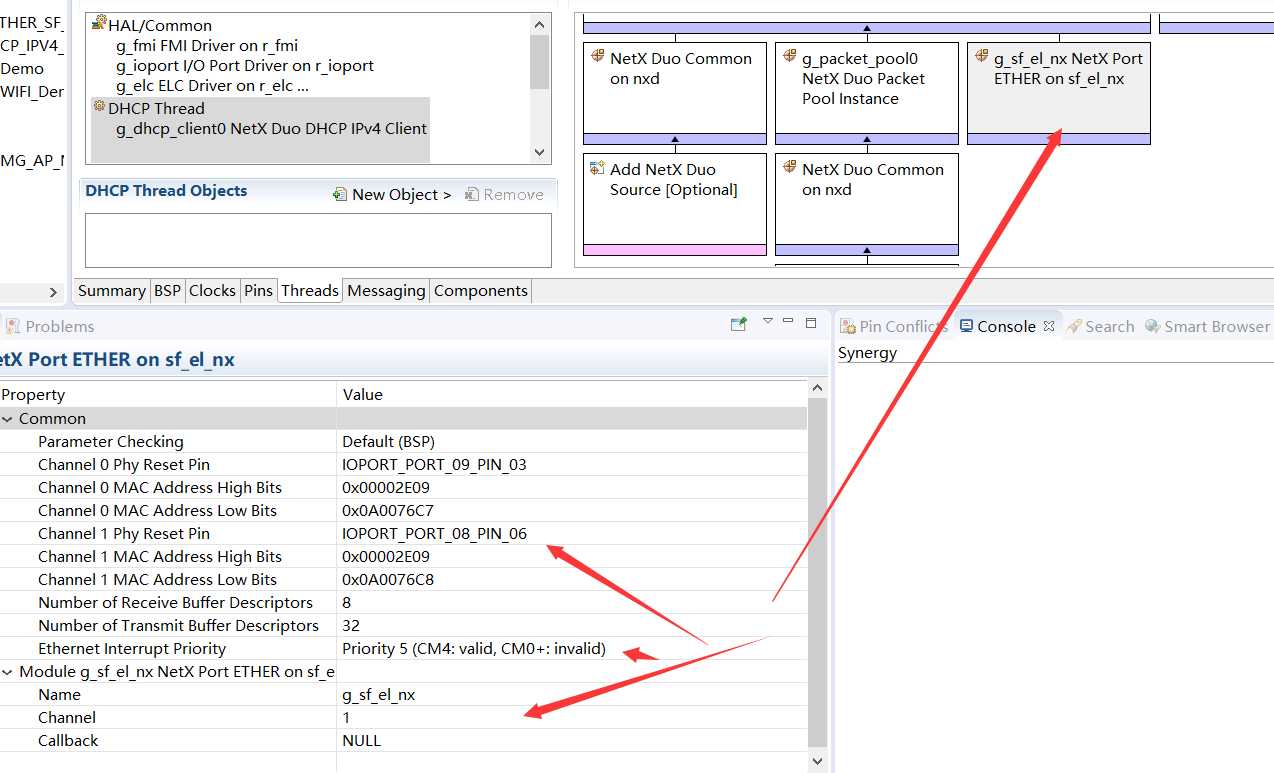标签:调试 release ping thread variables failed 分享图片 width stop
1、注意复位PIN:

2、SSP设置如下:

3、测试:
#include "dhcp_thread.h" /* Define the function to call for running a DHCP session. */ UINT run_dhcp_client_session(NX_DHCP *client_ptr, NX_IP *ip_ptr); /* If define, debug output sent to Renesas Virtual Console */ #define SEMI_HOSTING /* Define the wait limit for getting assigned an IP address. * NX_IP_PERIODIC_RATE is defined internally in NetX for converting * seconds to timer ticks. This timeout is defined for 2 seconds. */ #define WAIT_TO_BE_BOUND (10*NX_IP_PERIODIC_RATE) /* Define error status returns */ #define DHCP_RUN_ERRORS 0x1001 #define DHCP_START_ERROR 0x1002 /* If semi hosting is defined, define the debug output * method using printf. */ #ifdef SEMI_HOSTING #include "stdio.h" #ifdef __GNUC__ extern void initialise_monitor_handles(void); #endif #endif /* Define some global variables. */ static UINT error_counter = 0; static UINT is_bound = NX_FALSE; /* Declare the DHCP Client state change callback. */ static VOID my_notify_callback(NX_DHCP *dhcp_ptr, UCHAR new_state); char * xp_str_ip(char * x, uint32_t ip) { sprintf(x, "%u.%u.%u.%u", (uint8_t)(ip>>24 & 0xFF), (uint8_t)(ip>>16 & 0xFF), (uint8_t)(ip>>8 & 0xFF), (uint8_t)(ip>>0 & 0xFF)); return x; } /** * This function runs a DHCP Client session. * client_ptr; pointer to an NX_DHCP instance, an already created DHCP Client instance * ip_ptr; pointer to an NX_IP instance, an already created IP instance * If successful return NX_SUCCESS (0x0); else return DHCP_RUN_ERRORS error status. */ UINT run_dhcp_client_session(NX_DHCP *client_ptr, NX_IP *ip_ptr) { UINT status; NX_PACKET *my_packet; ULONG server_address; ULONG client_address; ULONG network_mask; UCHAR buffer[4]; UINT buffer_size = 4; ULONG *dns_server_ptr; UINT wait = 0; UINT wait_limit; char ip_string[20] = {0}; /* Initialize the debug output utility. */ #ifdef SEMI_HOSTING #ifdef __GNUC__ initialise_monitor_handles(); #endif #endif /* Register a DHCP state change callback function. */ status = nx_dhcp_state_change_notify(client_ptr, my_notify_callback); if (status) error_counter++; /* Now we‘re ready to start the DHCP Client. */ status = nx_dhcp_start(client_ptr); /* Check the status. */ if (status) { error_counter++; #ifdef SEMI_HOSTING if (CoreDebug->DHCSR & CoreDebug_DHCSR_C_DEBUGEN_Msk) { /* Debugger is connected */ printf("Aborting DHCP Client. Failed DHCP start 0x%x\n", status); } #endif /* Internal DHCP error or NetX internal error. We cannot continue this demo test. */ nx_dhcp_delete(client_ptr); return DHCP_START_ERROR; } #ifdef SEMI_HOSTING if (CoreDebug->DHCSR & CoreDebug_DHCSR_C_DEBUGEN_Msk) { /* Debugger is connected */ printf("DHCP Client is running\n"); } #endif /* Wait for the flag that the Client is Bound is set. */ wait = 0; wait_limit = WAIT_TO_BE_BOUND; while(wait < wait_limit) { /* If the is_bound flag is set, we have a valid IP address */ if (is_bound == NX_TRUE) break; /* Not bound yet. Let other application threads run. */ tx_thread_sleep(100); /* Update how long we‘ve waited */ wait += 100; } /* Check if Client is bound to an IP address. */ if (is_bound) { #ifdef SEMI_HOSTING if (CoreDebug->DHCSR & CoreDebug_DHCSR_C_DEBUGEN_Msk) { /* Debugger is connected */ printf("DHCP Client is assigned an IP address lease.\n"); } #endif /* It is. Get the client IP address from this NetX service. */ status = nx_ip_address_get(ip_ptr, &client_address, &network_mask); /* Check for errors. */ if (status) error_counter++; else { #ifdef SEMI_HOSTING if (CoreDebug->DHCSR & CoreDebug_DHCSR_C_DEBUGEN_Msk) { /* Debugger is connected */ printf("DHCP Client address is 0x%x. \n",(unsigned int)client_address); xp_str_ip(ip_string, client_address); printf("DHCP Client address is:%s\n",ip_string); } #endif } /* Get the DHCP Server IP address. */ status = nx_dhcp_server_address_get(client_ptr, &server_address); /* Check for errors. */ if (status) { error_counter++; } else { /* Check that the device is able to send and receive packets with this IP address. */ status = nx_icmp_ping(ip_ptr, server_address, "Hello World", sizeof("Hello World"), &my_packet, 3* NX_IP_PERIODIC_RATE); #ifdef SEMI_HOSTING if (CoreDebug->DHCSR & CoreDebug_DHCSR_C_DEBUGEN_Msk) { /* Debugger is connected */ printf("DHCP Server IP address is 0%x.\n", (unsigned int)server_address); xp_str_ip(ip_string, server_address); printf("DHCP Server address is:%s\n",ip_string); } #endif /* Check status. */ if (status) /* No valid ICMP packet received (no packet to release). Update the error counter. */ error_counter++; else { #ifdef SEMI_HOSTING if (CoreDebug->DHCSR & CoreDebug_DHCSR_C_DEBUGEN_Msk) { /* Debugger is connected */ printf("Successfully pinged Server.\n"); } #endif /* Release the echo response packet when we are done with it. */ nx_packet_release(my_packet); } } } /* Stop the DHCP Client. The application can still send and receive network packets. */ status = nx_dhcp_stop(client_ptr); if (status) error_counter++; /* Prepare the DHCP Client to restart. We can still send and receive * packets except broadcast packets, but with a source IP address * of zero, is not very useful except for DHCP. */ status = nx_dhcp_reinitialize(client_ptr); if (status) error_counter++; #ifdef SEMI_HOSTING if (CoreDebug->DHCSR & CoreDebug_DHCSR_C_DEBUGEN_Msk) { /* Debugger is connected */ printf("DHCP Client is reinitializing...\n"); } #endif /* Some time later.... */ tx_thread_sleep(100); /* Clear our previous DHCP session flag. */ is_bound = NX_FALSE; /* Restart the DHCP Client thread task. */ status = nx_dhcp_start(client_ptr); #ifdef SEMI_HOSTING if (CoreDebug->DHCSR & CoreDebug_DHCSR_C_DEBUGEN_Msk) { /* Debugger is connected */ printf("DHCP Client is restarted...\n"); } #endif /* Check status. */ if (status) { /* Update the error count. */ error_counter++; #ifdef SEMI_HOSTING if (CoreDebug->DHCSR & CoreDebug_DHCSR_C_DEBUGEN_Msk) { /* Debugger is connected */ printf("Aborting DHCP Client. Failed 2nd DHCP start 0x%x\n", status); } #endif /* Internal DHCP error or NetX internal error. We cannot continue this demo test. */ nx_dhcp_delete(client_ptr); } else { /* This time we‘ll poll the IP instance directly for a valid IP address. */ wait = 0; do { UINT actual_status; /* Check for address resolution. */ status = nx_ip_status_check(ip_ptr, NX_IP_ADDRESS_RESOLVED, (ULONG *) &actual_status, NX_IP_PERIODIC_RATE); /* Check status. */ if (status) { /* wait a bit. */ tx_thread_sleep(NX_IP_PERIODIC_RATE); wait += NX_IP_PERIODIC_RATE; if (wait >= wait_limit) { break; } } } while (status != NX_SUCCESS); /* Check if we have a valid address. */ if (status == NX_SUCCESS) { #ifdef SEMI_HOSTING if (CoreDebug->DHCSR & CoreDebug_DHCSR_C_DEBUGEN_Msk) { /* Debugger is connected */ printf("DHCP Client is assigned IP address lease for a second time.\n"); } #endif /* We do. This time, query the DHCP Client for the DNS Server address. */ status = nx_dhcp_user_option_retrieve(client_ptr, NX_DHCP_OPTION_DNS_SVR, buffer, &buffer_size); /* Check status. */ if (status) error_counter++; else { dns_server_ptr = (ULONG *)(buffer); /* Send a ping request to the DNS server. */ status = nx_icmp_ping(ip_ptr, *dns_server_ptr, "Hello DNS Server", sizeof("Hello DNS Server"), &my_packet, 3* NX_IP_PERIODIC_RATE); /* No valid ICMP packet received (no packet to release). Update the error counter. */ if (status) error_counter++; else { #ifdef SEMI_HOSTING if (CoreDebug->DHCSR & CoreDebug_DHCSR_C_DEBUGEN_Msk) { /* Debugger is connected */ printf("Successfully pinged Server.\n"); } #endif /* Release the echo response packet when we are done with it. */ nx_packet_release(my_packet); } } /* We‘re done with the DHCP Client. */ /* Release the IP address back to the Server. This application should not send or receive packets with this IP address now. */ status = nx_dhcp_release(client_ptr); if (status) error_counter++; else { #ifdef SEMI_HOSTING if (CoreDebug->DHCSR & CoreDebug_DHCSR_C_DEBUGEN_Msk) { /* Debugger is connected */ printf("Released IP address back to Server.\n"); } #endif } } #ifdef SEMI_HOSTING if (CoreDebug->DHCSR & CoreDebug_DHCSR_C_DEBUGEN_Msk) { /* Debugger is connected */ printf("Stopping the DHCP Client.\n"); } #endif /* Stop the DHCP Client and unbind the DHCP UDP socket.*/ status = nx_dhcp_stop(client_ptr); if (status) error_counter++; } /* All done. Delete the Client and release resources to NetX and ThreadX. */ status = nx_dhcp_delete(client_ptr); if (status) error_counter++; #ifdef SEMI_HOSTING if (CoreDebug->DHCSR & CoreDebug_DHCSR_C_DEBUGEN_Msk) { /* Debugger is connected */ printf("DHCP Client demo has completed with %d errors.\n", error_counter); } #endif /* Return a status value based on any errors encountered. */ if (error_counter == 0) { return NX_SUCCESS; } else { return DHCP_RUN_ERRORS; } } /** * This function defines a user callback for DHCP Client to notify * when there is a DHCP state change. * NX_DHCP *client_ptr; previously created DHCP Client instance * UCHAR state; 2 byte numeric representation of DHCP state * void * * In this callback, we only check if the DHCP * Client has changed to the bound state (has a valid IP * address) and we set a flag for the application to check. */ VOID my_notify_callback(NX_DHCP *dhcp_ptr, UCHAR state) { UINT new_state = (UINT)state; NX_PARAMETER_NOT_USED(dhcp_ptr); /* Check if we have transitioned to the bound state (have a valid IP address). */ if (new_state == NX_DHCP_STATE_BOUND) { /* We have. Set the flag for the application. */ is_bound = NX_TRUE; } } /* Define the application thread. */ void dhcp_thread_entry(void) { UINT error_counter = 0; UINT status; /* Wait for the IP stack and network hardware * to get initialized. */ tx_thread_sleep(3 *NX_IP_PERIODIC_RATE); /* Start and run a brief DHCP Client session. */ status = run_dhcp_client_session(&g_dhcp_client0, &g_ip0); /* Check for successful result. */ if (status) error_counter++; }
4、调试信息如下:
DHCP Client is running DHCP Client is assigned an IP address lease. DHCP Client address is 0xc0a81f7d. DHCP Client address is:192.168.31.125 DHCP Server IP address is 0c0a81f01. DHCP Server address is:192.168.31.1 Successfully pinged Server. DHCP Client is reinitializing... DHCP Client is restarted... DHCP Client is assigned IP address lease for a second time. Successfully pinged Server. Released IP address back to Server. Stopping the DHCP Client. DHCP Client demo has completed with 0 errors.
标签:调试 release ping thread variables failed 分享图片 width stop
原文地址:https://www.cnblogs.com/jiangzhaowei/p/8949892.html